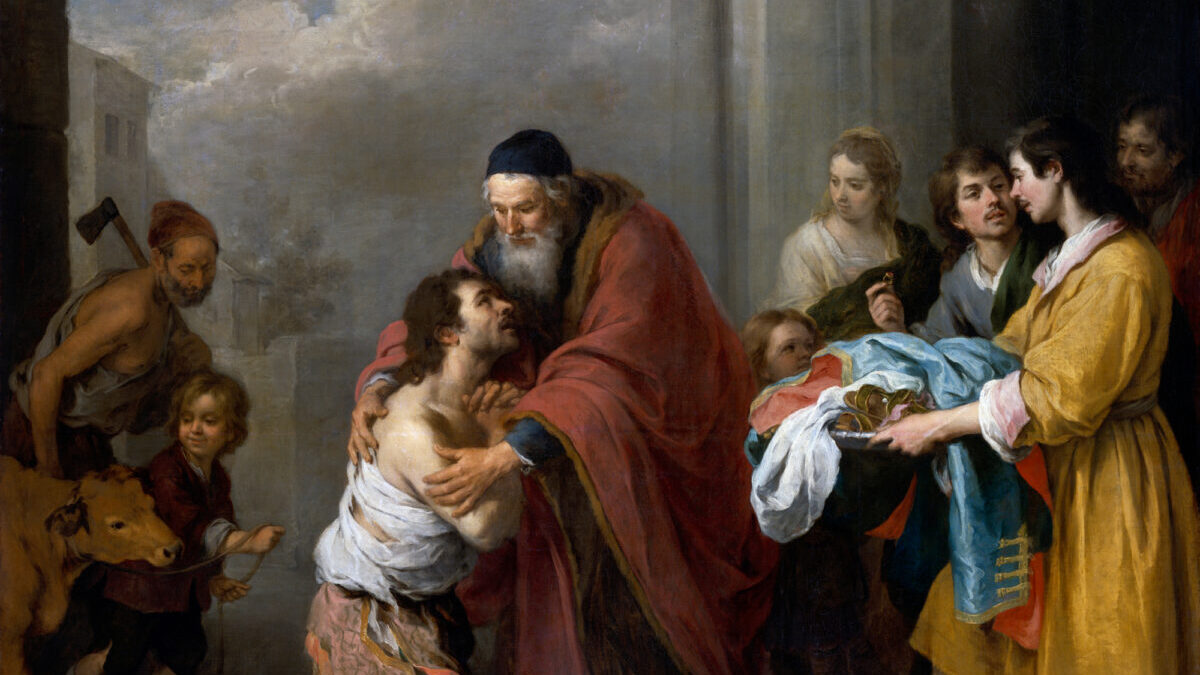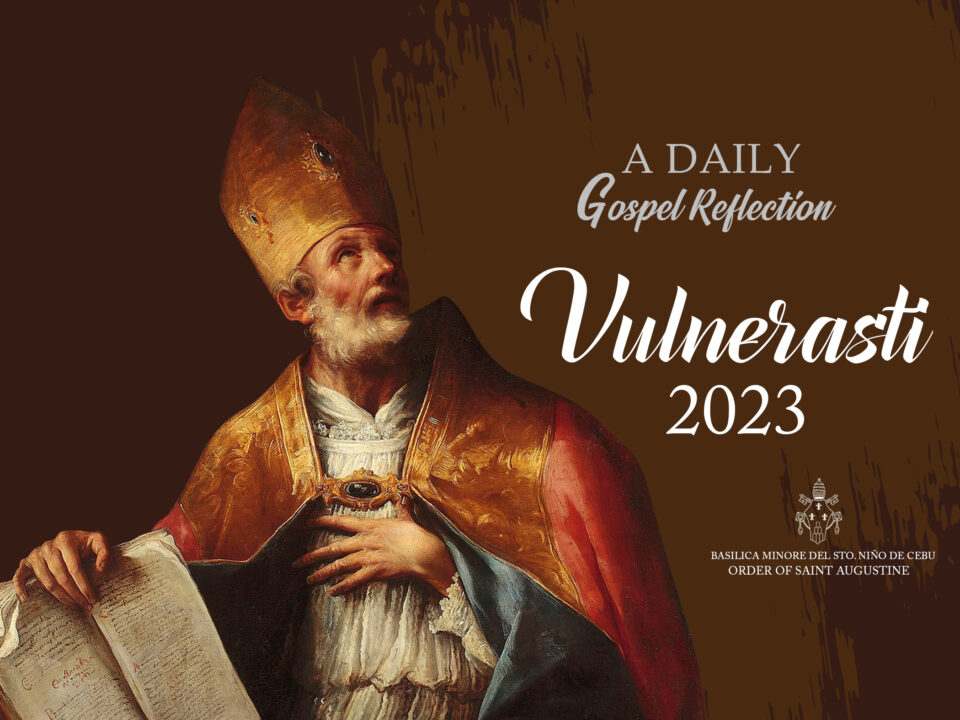Twenty-fourth Sunday in Ordinary Time

https://www.1517.org/articles/gospel-luke-151-3-11-32-lent-4-series-c
Today’s Reflection
Gospel: Lk 15:1-32
September 11, 2022 | Sunday
Meanwhile tax collectors and sinners were seeking the company of Jesus, all of them eager to hear what he had to say. But the Pharisees and the teachers of the law frowned at this, muttering, “This man welcomes sinners and eats with them.” So Jesus told them this parable:
“Who among you, having a hundred sheep and losing one of them, will not leave the ninety-nine in the wilderness, and seek the lost one till he finds it? And finding it, will he not joyfully carry it home on his shoulders? Then he will call his friends and neighbors together, and say, ‘Celebrate with me, for I have found my lost sheep!’ I tell you, in the same way, there will be more rejoicing in heaven over one repentant sinner, than over ninety-nine decent people, who do not need to repent.
What woman, if she has ten silver coins and loses one, will not light a lamp, and sweep the house in a thorough search, till she finds the lost coin? And finding it, she will call her friends and neighbors, and say, ‘Celebrate with me, for I have found the silver coin I lost!’ I tell you, in the same way, there is rejoicing among the angels of God over one repentant sinner.”
Jesus continued, “There was a man with two sons. The younger said to his father, ‘Give me my share of the estate.’ So the father divided his property between them.
Some days later, the younger son gathered all his belongings and started off for a distant land, where he squandered his wealth in loose living. Having spent everything, he was hard pressed when a severe famine broke out in that land. So he hired himself out to a well-to-do citizen of that place, and was sent to work on a pig farm. So famished was he, that he longed to fill his stomach even with the food given to the pigs, but no one offered him anything.
Finally coming to his senses, he said, ‘How many of my father’s hired workers have food to spare, and here I am starving to death! I will get up and go back to my father, and say to him, Father, I have sinned against God, and before you. I no longer deserve to be called your son. Treat me then as one of your hired servants.’ With that thought in mind, he set off for his father’s house.
He was still a long way off, when his father caught sight of him. His father was so deeply moved with compassion that he ran out to meet him, threw his arms around his neck and kissed him. The son said, ‘Father, I have sinned against Heaven and before you. I no longer deserve to be called your son.’
But the father turned to his servants: ‘Quick!’ he said. ‘Bring out the finest robe and put it on him! Put a ring on his finger and sandals on his feet! Take the fattened calf and kill it! We shall celebrate and have a feast, for this son of mine was dead, and has come back to life; he was lost, and is found!’ And the celebration began.
Meanwhile, the elder son had been working in the fields. As he returned and approached the house, he heard the sound of music and dancing. He called one of the servants and asked what it was all about. The servant answered, ‘Your brother has come home safe and sound, and your father is so happy about it that he has ordered this celebration, and killed the fattened calf.’
The elder son became angry, and refused to go in. His father came out and pleaded with him. The son, very indignant, said, ‘Look, I have slaved for you all these years. Never have I disobeyed your orders. Yet you have never given me even a young goat to celebrate with my friends. But when this son of yours returns, after squandering your property with loose women, you kill the fattened calf for him!’
The father said, ‘My son, you are always with me, and everything I have is yours. But this brother of yours was dead, and has come back to life; he was lost, and is found. And for that we had to rejoice and be glad.’”
Today’s Reflection:
In the Gospel Reading, Jesus speaks of three parables on repentance—namely, the lost sheep, the lost coin, and the lost son. He ends the parables of the lost sheep and lost coin with an explicit note on great rejoicing over a sinner who repents (v. 7 and v. 10). While he does not use the words “sin” and “repent” in the parable of the lost son, he does explicitly make note of great rejoicing over a wayward son in this parable (vv. 24, 32). It must be born in mind that these parables are Jesus’ response to the charge of the scribes and the Pharisees that he welcomes tax collectors and sinners and even eats with them (vv. 1-2). These sinners and tax collectors are not said to have been repentant. Why then does the Lord rebut the scribes and the Pharisees by underscoring “a repentant sinner” in each of the three parables?
Let me attempt an answer by delving into the nuances of “sin” and “repentance.” The Greek word for “sin”—namely, hamartia (ἁμαρτία)—can also mean missing a mark or erring in judgment. In that sense, aside from a transgression on the Lord’s commandment or will, a sin can also refer to a failure in understanding a concept or an error in judgment. Moreover, the Greek word for “repentance” is metanoia (μετάνοια), which also refers to a change of attitude as a result of a complete change of mind (Louw-Nida). In that case, aside from turning away from sins, repentance entails a change in behavior as a consequence of a change of mind on certain matters.
With these nuances in mind, we may posit that Jesus emphasizes the theme of rejoicing over a repentant sinner in order to instruct the Pharisees and scribes on two points. The first is that they should rejoice—rather than grumble—at the prospect that the sinners and tax collectors may change their minds and then reform their attitudes in the course of their encounter with Jesus.
The second is that they should realize that they themselves have SINNED or that they have missed the mark or erred in their picture of God as a legalistic and stiff judge who excludes those who fail to observe the Mosaic Law. The Lord would like them to REPENT or change their image of God in at least two points. Let me illustrate these points by making use of some striking elements in the parable of the lost son.
Firstly, God is far more merciful than the scribes and the Pharisees have ever imagined. This is shown in the father’s act of rejoicing at the return of the estranged younger son who has squandered his share of the father’s property (vv. 23-24). The father shows absolute mercy on the wayward son despite his insincerity as intimated in his rehearsed speech which smacks of deception. What he intends in it is to take advantage of his father’s kindness the second time around (vv. 18-19, 21).
Secondly, God is far more inclusive than they have ever imagined. The scribes and the Pharisees believed that God is exclusively revealed in their religious tradition and that they are the privileged recipient of God’s grace. That God is also revealed to the outsiders and that he extends his saving grace to them is suggested in how the father goes “outside” his home twice in the story. First, upon seeing his returning younger son from afar, he runs out of his home to meet him (v. 20). Second, when the enraged elder son refuses to get in their home and join the feast, the father goes out and pleads that he joins them inside. It should be recalled that when the Lord started his ministry in Nazareth, he made it clear that God’s offer of salvation is also extended to non-Jews (cf. Lk 4:16-30).
The Pharisees and the scribes who must have readily identified with the elder son are in no way excluded from the Kingdom of God as intimated in the father’s assurance: “Son, you are always with me, and all that is mine is yours” (v. 31). But they are not immediately convinced as hinted by the parable’s silence on whether the elder son finally joins the feast. Implied herein is that repentance or radical change of mind is a long and tedious process.
Indeed, abandoning our long-held paradigms and embracing new ones take a long and difficult process. But it is liberating and hope-giving, especially at the institutional or ecclesial level. For example, it was only in 1996, or it took about 350 years for the Church to have formally apologized for condemning Galileo Galilei (1564-1642) whose theory that the sun rather than the earth is the center of the solar system runs contrary to the earth-centered universe suggested in the biblical creation stories. Herein we ask ourselves a couple of questions as regards to our life as the People of God, as the Church. In the light of our greying Churches (Western Europe) that are getting emptier: When will the Church ever find out that she must have erred or sinned in some of her long held beliefs and structures? When will she institute some badly needed reforms? (by Fr. Lazaro N. Ervite, OSA) /Vulnerasti, 2022



